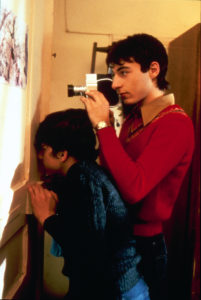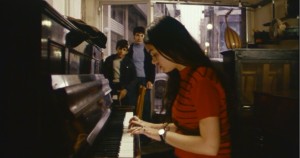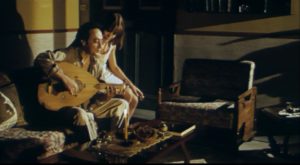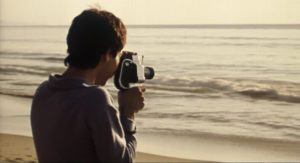West Beirut
Directed by Ziad Doueiri
1998 | Lebanon
 West Beirut is a buddy film with a girl and a Super 8 camera in the middle. Written and directed by Ziad Doueiri, who started working in Hollywood as first camera assistant on Tarantino’s Reservoir Dogs and Pulp Fiction, the film is a coming of age story set during the Lebanese civil war.
West Beirut is a buddy film with a girl and a Super 8 camera in the middle. Written and directed by Ziad Doueiri, who started working in Hollywood as first camera assistant on Tarantino’s Reservoir Dogs and Pulp Fiction, the film is a coming of age story set during the Lebanese civil war.
Tarek (played by Doueiri’s younger brother Rami) and Omar (a kid the director plucked from an orphanage) are bound together by their love of filming and cinema. Tarek is the practical joker whose mouth is always getting him into trouble. In April 1975, he is expelled from his French class and while standing on the school’s balcony he witnesses Phalangist gunmen ambush a bus, killing 27 Palestinian passengers. This assault in the Ayn-al-Rummanah district of Beirut, a true historical event, supposedly came in revenge for a previous attack on a Maronite church frequented by Phalangists. More significantly, it was the spark that set off Lebanon’s 15-year-long civil war.
The beginning of the fighting precipitates the closure of Tarek and Omar’s school and this initial period of the conflict spells only freedom and fun for the boys. But once the city is divided by checkpoints and a Christian girl, May (Rola al-Amin) moves into Tarek’s apartment building, the three of them try to cross from mostly Muslim West Beirut to the eastern side of the city. For over there is the only lab that still processes Super 8 in a city dominated by the latest technology of video.
 Meanwhile the adults are reacting badly to the war. Tarek’s father Raid (Joseph Bou Nasser), an intellectual whose profession is unclear except for his love of French poetry, and his mother Hala (Carmen Loubbos), an attorney, argue throughout about what is better: to stay in or to abandon the city. Meanwhile Omar’s family is undergoing a transformation from secular Muslims to orthodox ones and what his father considers proper religious behaviour. For a family who has never attended dawn prayers, he suddenly wants them to go to the mosque. Meanwhile at home he bans cinema and rock & roll, a practice that prompts Tarek to ask Omar: ‘You mean Paul Anka is in the service of Satan?’ The two boys, smoking cigarettes in Omar’s bedroom, listening and dancing around George McCrae’s mid-1970s disco hit, ‘Rock Me Baby’, captures the return to innocence before the reality and brutality of war intrudes. It is just one of many such touches that make this film a delight.
Meanwhile the adults are reacting badly to the war. Tarek’s father Raid (Joseph Bou Nasser), an intellectual whose profession is unclear except for his love of French poetry, and his mother Hala (Carmen Loubbos), an attorney, argue throughout about what is better: to stay in or to abandon the city. Meanwhile Omar’s family is undergoing a transformation from secular Muslims to orthodox ones and what his father considers proper religious behaviour. For a family who has never attended dawn prayers, he suddenly wants them to go to the mosque. Meanwhile at home he bans cinema and rock & roll, a practice that prompts Tarek to ask Omar: ‘You mean Paul Anka is in the service of Satan?’ The two boys, smoking cigarettes in Omar’s bedroom, listening and dancing around George McCrae’s mid-1970s disco hit, ‘Rock Me Baby’, captures the return to innocence before the reality and brutality of war intrudes. It is just one of many such touches that make this film a delight.
Through a fluke, Tarek, Omar and May end up in East Beirut, where they visit the city’s legendary brothel, Oum Walid’s. Tarek believes that peace would come if Palestinian leader Yasser Arafat and Pro-Israeli Lebanese president-elect Bachir Gemayel met at Oum Walid’s and together enjoyed the hospitality of the house.
 Towards the end of the film director Doueiri does something remarkable with the story. If viewers are wondering what will happen to Tarek’s family under siege, the frustration of his mother with her husband’s determination to stay in Beirut only results in tragedy. The last few seconds of the film play this out in a sequence of entirely visual imagery, with no words or explanation except for the sound of an oud and background musical orchestration. (The latter provided by Stuart Copeland of the English pop group The Police who lived in Beirut for a decade while his father ran the CIA’s bureau there).
Towards the end of the film director Doueiri does something remarkable with the story. If viewers are wondering what will happen to Tarek’s family under siege, the frustration of his mother with her husband’s determination to stay in Beirut only results in tragedy. The last few seconds of the film play this out in a sequence of entirely visual imagery, with no words or explanation except for the sound of an oud and background musical orchestration. (The latter provided by Stuart Copeland of the English pop group The Police who lived in Beirut for a decade while his father ran the CIA’s bureau there).
For Doueiri who grew up and lived in Beirut, the film is autobiographical. As he told Kee Chang of the Anthem website earlier this year, ‘There was no particular moment revealed to me that I wanted to tell stories … However, the Filmmaker Ron Fricke certainly contributed to this. I remember seeing Koyyanisquatsi in the early eighties. I went and bought an Elmo Super 8 camera and started to experiment with time-lapse photography. Then Fricke did Chronos, then Baraka. To me, he’s the most inspiring filmmaker. Unconsciously, I’m always trying to imitate him.’
West Beirut is a timely reminder of the Middle East at war and how the people who are the worst affected are those who have no power whatsoever to change the situation.
– Malu Halasa
London-based journalist writer and editor Malu Halasa is our writer-in-residence. Keep your eyes peeled for her posts in the run-up and during the festival.
For more information and to book tickets, please click here.


